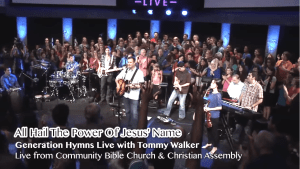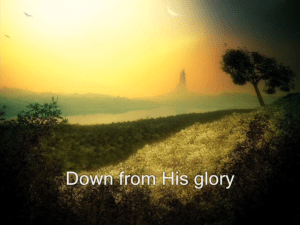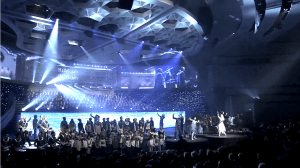Handel’s Messiah Story

See also
Messiah – with Bible verses and references
https://renewaljournal.com/2019/07/11/messiah-with-bible-verses-and-references/
Hallelujah Chorus – Messiah – International Choirs
https://renewaljournal.com/2018/04/04/hallelujah-chorus-messiah-international-choirs/

The Messiah Story – its early impact in history – 30 minute video
Concludes with the Hallelujah Chorus

G F Handel – The Story of Messiah. A Documentary by Howard Goodall CBE
Here, composer Howard Goodall presents his personal (2009) account of Handel’s extraordinary oratorio. Indisputably a work of colossal musical genius, Handel’s Messiah holds a momentous place in the repertoire of Western music. Its choruses and arias are among the most popular and celebrated pieces of sacred Baroque music ever written. Handel is reputed to have sobbed as he completed it saying: “I did think I did see all Heaven before me and the great God himself”. During its London premiere in 1743, Britain’s King George II rose to his feet at the start of the Hallelujah chorus and remained standing until the end, a tradition that is followed around the world today, even in fervent republics such as the United States of America.
__________________________
Messiah is an English-language oratorio composed in 1741 by George Friedrich Handel, with a scriptural text compiled by Charles Jennens from the King James Bible (1611), and from the version of the Psalms included with the Book of Common Prayer. The music for Messiah was completed in 24 days of swift composition. His servants would often find him in tears as he composed. At the end of his manuscript, Handel wrote the letters “SDG”—Soli Deo Gloria, “To God alone the glory”.
_______________________
Librettist Charles Jennens’ Preface to the word book of the original edition, April 1742 says:
MAJORA CANAMUS [Latin: WE SING MAJOR SONGS]
“And without controversy great is the mystery of godliness: God was manifest in the flesh, justified in the Spirit, seen of angels, preached unto the Gentiles, believed on in the world, received up into glory.” (1 Timothy 3:16)
“In whom are hid all the treasures of wisdom and knowledge.” (Colossians 2:3)
___________________________________
While Handel was writing the ‘Hallelujah’ chorus his servant discovered him with tears in his eyes, and Handel exclaimed, “I did think I did see all Heaven before me, and the great God Himself seated on His throne, with His company of Angels.”
His mighty thunder: No less than Ludwig van Beethoven, citing the Messiah, called Handel the “greatest composer who ever lived. … I would uncover my head and kneel before his tomb.” And Mozart declared himself ”to be humble in the face of Handel’s genius. … Handel knows better than any of us what will make an effect. When he chooses, he strikes like a thunderbolt.”
________________
Share good news – Share this page freely
Copy and share this link on your media, eg Facebook, Instagram, Emails:
Handel’s Messiah Story
Messiah – with Bible verses and references
Hallelujah Chorus – Messiah – International Choirs
Renewal Journal Main Page – free PDF ebooks
I still remember the first time I heard Messiah sung. I was in high school in the Australian NSW country city of Tamworth and went with my mother to a combined churches performance of Messiah in the Methodist Church. When we all stood for the Hallelujah Chorus I was bursting inside. Hallelujah! King of kings and Lord of lords, and he shall reign forever and ever. Hallelujah. It clobbered me! I was reeling for days and singing my version of Hallelujah endlessly.
No wonder King George II of England stood to honour the King of kings and Lord of lords during the Hallelujah Chorus at the first London performance of Messiah, and everyone stood with him, and most still do.
I was enthralled. It was the first time I had heard an Oratorio live, and it was all Scripture!
It was December, a Christmas tradition globally is to sing Messiah at Christmas, even though it was originally an Easter performance.
It was Christmas holidays, school over, exams finished, and blissful freedom! Back at home I grabbed my Cruden’s Concordance and tracked down the whole score of Messiah. The program of the performance in the church included the script of all the verses they sang, but without the Bible references. So I tracked down the references from my Concordance. Now you can get it immediately from Google! And I have links to it here: Messiah – with Bible verses and references.
That Christmas I bought my first vinyl record: Hallelujah Chorus topside and Worthy is the Lamb on the back. I wore out dozens of record player needles playing them over and over till they sounded a bit scratchy. Eventually I splurged to buy a long playing vinyl record of Messiah.
What an astounding story. Thank you Charles Jennens for that masterful script.
“The lyrics for Messiah were drawn directly from scripture, in a collation by Charles Jennens, an aristocrat and musician/poet who had worked with Handel on a couple of earlier oratorios. Jennens compiled a libretto with profound thematic coherence and an enhanced sensitivity to dramatic and musical structure. He sent the libretto to Handel in July 1741, and Handel began setting it to music the following month. Handel started at the beginning of the texts and worked consecutively through them, tracing and accentuating through music the powerful dramatic arc that Jennens had created.”
(https://www.thetabernaclechoir.org/messiah/libretto-with-scripture-links.html?lang=eng)
Handel completed the whole Messiah in an astounding 24 days.
Roy Atwood describes why the king stood.
Why the King stood for the Hallelujah chorus
When the music for this biblical passage began, King George, I believe, made a statement about royal authority and honor:
The Christian King of England is not the Supreme Authority, but he is one under authority and must show honor and respect to his Supreme Lord, the King of Kings. Just as people rise to show honor and respect in the presence of their English Royals, King George could do no less, as one under Authority.
Here’s my argument for why the King George stood that day and why we should still do so today.
King George II stood up at the performance of George Frederick Handel’s “Hallelujah chorus” on March 23, 1743. No one knows for sure why he stood. He never explained his actions.
The most popular and most repeated modern myth is that “he was so moved” or “overcome by emotion” by the music that he felt compelled to stand. A few simple observations undermine this thin explanation:
- Kings are hardly ones to emote in public spontaneously (a review of English kings and queens over the centuries will reveal precious few instances of spontaneity or public displays of exuberance);
- Standing in the middle of a performance of a major orchestral and choral work today or in yesteryear is never encouraged–in fact, it would be considered rude and not something a King would likely do without a very compelling reason (even jazz musicians today only receive polite applause at the end of a praiseworthy set–rarely do audiences jump out of their seats during a formal performance);
- Kings sit (enthroned), subjects stand. The King was not stretching his legs, getting ready to walk out, etc.
This modern myth endures, I believe, because in our secular and egalitarian age folks simply no longer have the cultural bearings or theological categories to understand what was happening at that moment or what would have motivated the English king to stand at that particular moment in that particular performance.
The answer as to why the King stood there and then is rooted, I believe, in the political implications of the very specific lyrics of the chorus, particularly the words from Revelation 19, highlighted in bold, and their immediate context (see the updated note below):
Hallelujah! Hallelujah! Hallelujah!
Hallelujah! Hallelujah!
For the Lord God Omnipotent reigneth.
Hallelujah! Hallelujah! Hallelujah! Hallelujah!
For the Lord God omnipotent reigneth.
Hallelujah! Hallelujah! Hallelujah! Hallelujah!
Hallelujah! Hallelujah! Hallelujah!
The kingdom of this world
Is become the kingdom of our Lord,
And of His Christ, and of His Christ;
And He shall reign for ever and ever,
For ever and ever, forever and ever,
King of kings, and Lord of lords,
King of kings, and Lord of lords,
And Lord of lords,
And He shall reign,
And He shall reign forever and ever,
King of kings, forever and ever,
And Lord of lords,
Hallelujah! Hallelujah!
And He shall reign forever and ever,
King of kings! and Lord of lords!
And He shall reign forever and ever,
King of kings! and Lord of lords!
Hallelujah! Hallelujah! Hallelujah! Hallelujah!
Hallelujah!
King George was a Christian king, head of the English Church, and would have been knowledgeable of the Scriptures. He knew, from the moment the choir began singing that passage, that it was referring to his Lord, to a King greater than himself. The King of kings is the King of England’s superior. The King of England is a subject of the Greater King, the Creator and Sovereign of Heaven and Earth. As a Christian King who believed in the Divine Right of Kings, he would have acknowledged even at his own coronation that he rules England only by the grace of the Great King and no other. If the Triune God were to walk into the same room, the King of England would be compelled to rise and bow in His honor.
So when Handel’s music for this passage began, I believe King George made a political statement about divine and royal authority and honor in the political economy of England itself: the Christian King (or Queen) of England is a ruler under authority and must pay honor and show respect to his (her)Supreme Lord, the King of Kings, just as the people must pay honor and show respect to their English Lord.
Larry Spalink, a friend from Westminster Seminary and pastor laboring in Japan commented to me once that the context immediately preceding the Hallelujah Chorus are the words of Psalm 2, which exhort us to give honor to God’s Messiah. Or not, at our peril. 1
The people also stood with King George at that moment. The question is whether they stood because England’s King rose, or because the presence of the King of kings was evident in the Scriptures being sung. I like to think they stood together in solidarity at that moment as fellow subjects of the Greater King. If there were an emotional response, it was King George’s realization that the living God is his King and all other leaders of men and nations serve behind His beneficent rule and at His good pleasure.
For that reason, we all should stand whenever the King of kings and Lord of lords, our God’s Messiah’s presence is announced.
All rise!
And He shall reign forever and ever,
King of kings, forever and ever,
And Lord of lords,
Hallelujah! Hallelujah! Hallelujah! Hallelujah!
Hallelujah!
I stood to honour my King, the King of kings.

Messiah – 2:17 hours (10 million views, Hallelujah at 1:36 & 2:13 hrs)
See also:
See also: Wonders of Worship
See also: Virtual Choirs & Orchestras
See also: How Great Thou Art – anthology
See also: Messiah & Hallelujah Chorus
See also: Hallelujah Chorus – International Choirs
See also: Easter Worship
See also: Christmas Worship
GENERAL BLOGS INDEX
BLOGS INDEX 1: REVIVALS (BRIEFER THAN REVIVALS INDEX)
BLOGS INDEX 2: MISSION (INTERNATIONAL STORIES)
BLOGS INDEX 3: MIRACLES (SUPERNATURAL EVENTS)
BLOGS INDEX 4: DEVOTIONAL (INCLUDING TESTIMONIES)
BLOGS INDEX 5: CHURCH (CHRISTIANITY IN ACTION)
BLOGS INDEX 6: CHAPTERS (BLOGS FROM BOOKS)
BLOGS INDEX 7: IMAGES (PHOTOS AND ALBUMS)
BACK TO MAIN PAGE
FREE SUBSCRIPTION: for new Blogs & free offers
Share good news – Share this page freely
Copy and share this link on your media, eg Facebook, Instagram, Emails:
Handel’s Messiah Story
Messiah – with Bible verses and references:
https://renewaljournal.com/2019/07/11/messiah-with-bible-verses-and-references/





























































































































































































